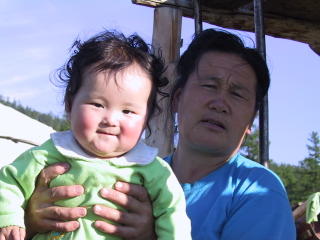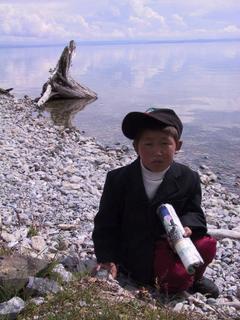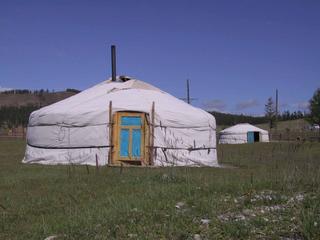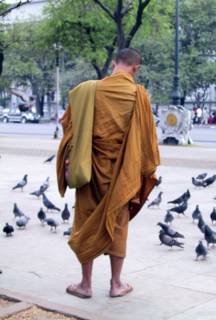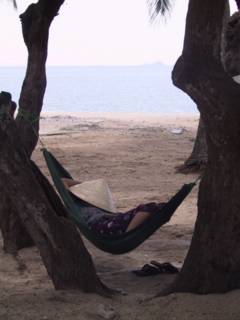Tuesday, April 18, 2006
Saturday, September 03, 2005
Monday, August 22, 2005
threadbare and black
Strangers, contained within one round wall.
Sunday, August 07, 2005
Saturday, August 06, 2005
scattered
Wood, flames, presence, place. Her here and now of being curled up tightly on a low sagging cot, covered in thick, bright blankets and aligned along the left-hand curve of the ger’s wood and felt wall. Her here and now where the round woodstove squatted solidly, stoically at the center of the ger and her world. Warming, holding, protecting. Her here and now where the draft carried down through the circular smoke hole in the gently domed ceiling was harmless, tender. A gentle whisper escaping from the Mongolian countryside as it stirred, stretched, awakened with the spreading light.
But somewhere her light touch on each breath, each thought, each moment, had hardened, had gripped too tightly to one thought, one feeling or the next. And then the loss, of course, the slipping of moments into space, was inevitable. And it was only some time later (though just how much later she couldn’t be sure) that she came to. Caught herself, her mind, at it again. Doing, plotting, spinning. Flailing madly about with the ten thousand things. With where they were and might eventually be. And, in catching this, she of course knew that those missed moments, those lost in the space between then and now, could never be recovered.
Uncurling, rolling onto her back to chasten herself and stare at the cloth-covered ceiling, she dared hope for empathy. For answers. Why do we do that? How can we stop it? Why not touch lightly on each thing, on all things, without—sooner or later—clasping too tightly (and losing forever all that escapes our small, clenched fists)? But no answers came. So she sighed, let go, and began again.
Monday, March 28, 2005
work in the invisible
at least as hard as you do in the visible. Be companions
with the prophets even though
no one here will know that you are . . .”
—Rumi, as translated by Coleman Barks, The Soul of Rumi: A New Collection of Ecstatic Poems
Friday, March 04, 2005
“Time is but the stream I go a-fishing in. I drink at it; but while I drink I see the sandy bottom and detect how shallow it is. Its thin current slides away, but eternity remains. I would drink deeper; fish in the sky, whose bottom is pebbly with stars. I cannot count one. I know not the first letter of the alphabet. I have always been regretting that I was not as wise as the day I was born. The intellect is a cleaver; it discerns and rifts its way into the secret of things.”—Henry David Thoreau, Walden
Tuesday, February 15, 2005
jody g.
(Her being the boy and her dad being away.)
Thursday, February 10, 2005
She couldn’t help but think it was (almost) always a
Good thing.
Especially for those with longing, forlorn,
Broken hearts.
Saturday, January 29, 2005
She laid still and listened, the near-full moon watching through her window.
Wednesday, January 26, 2005
casting the i-ching
She didn’t really believe in it, after all. But both times—those two desperate times—involved love. And a spiritual teacher.
The first time, the I-Ching was horribly, miserably, painfully accurate (as much as she had tried to fight its answers).
The second time, well, she guessed the days would tell. But, anyway, the answer wasn’t really so bad. It was even kind of good (or at least not nearly so tragic as she had imagined her situation to be).
Plus, she’d cast it twice. A week or so apart with eerily similar conclusions (or non-conclusions, as the case may be).
The first cast, during days of presumed loss and far too much crying, read: “Initial Obstacles—Giving birth to the new has potential for great success, but there are difficulties to be overcome.” And its “Appropriate Action” counseled: “Temporarily sacrifice other interests and focus on the situation at hand. Through careful sorting replace chaos with order. Get help from others and remain determined. Do not act prematurely. . . . Resolve disorder slowly.”
Replace chaos with order. Resolve disorder slowly. Fatima liked that.
But she was doubtful. And kept crying.
The second cast, a week or so later, when the crying had mostly subsided and a hollow, empty, resolved feeling remained, read: “Obstacles—Obstacles can and should be overcome. The highest barriers often conceal the greatest blessings.” And its “Appropriate Action” advised: “Rather than forcing ahead, retreat and let strength and means accumulate. Seek advice from an appropriate source. Seek assistance, and remain determined. Look to your own inner development to see what is actually inhibiting progress. . . . Acting in obedience to a higher authority, one confronts obstacle after obstacle, but there is no blame.”
Retreat. Look to your own development. No blame. Fatima liked that too.
But she still cried a little. And kept feeling sad.
Yet she knew (between the tears) that what was just was.
And, really, that’s all it could (and would) be.
So she’d wait. And go for a walk. And (meanwhile) admire the moon.
Saturday, January 22, 2005
happy and sad
amidst milk cartons and jungle gyms,
she lost discernment between happy and sad
(or maybe just the illusion
that there was ever a difference).
Friday, January 21, 2005
dear alex
do not imagine that your torment, your longing, your sadness, your aloneness are sharper than my own. but do not imagine either that i seek reprieve from the pain and freedom and wonder of it all. of willing, eager hopelessness and helplessness.
i ask you, alex—because i genuinely long to know—do your words closely and fully reflect how you see existence and your place in “it”? or are they merely side notes scribbled in the margins of your consciousness? a consciousness that embraces all of the pain and joy and death and life, which, upon closer (or perhaps farther) reflection, are all the same this that is “it” that is beautiful.
love, x.
Thursday, January 13, 2005
on shyness.
Hmm, she thought. I’d never thought of it that way before. But he could be right. Or at least partway right. Part of the time.
Shyness was, after all, a big, sweeping, funny sort of word. The sort that included a whole hell of a lot of things. And nothing at all.
All of those moments—those countless moments—when she felt physically, viscerally, powerless to speak. When, if she forced words to come, they were stilted and stale and weird to her own ears—and certainly to those of others (at best). And, at worst, they were taken at surface value, though they did absolutely nothing, nothing, nothing at all to convey the soul of what she was thinking, feeling, being inside. And that very distance, that disconnect, between what was in here and what she forced to the surface made it all seem so futile—and such a physical struggle—to speak at all.
And it (shyness, that is) also covered those other moments. Those times when she hid from people and things and situations and herself on purpose—or at least on the edge of purpose (but certainly not entirely unconsciously, unknowingly). Because she just couldn’t deal with it all. The people. The consequences. Herself. Herself. Better—in those times—just to not be (at least not to anyone other than herself, who she figured she was pretty much stuck with).
And it (shyness, again) also covered the usual tedious, tired state of things. When she assumed that those around her saw so clearly, so transparently, the worst of whom she was and might be. And so being quiet and shy and withdrawn seemed entirely called for. Less exposure. Less dissonance. Less hurt. All around.
But, really, she thought, it was that first sort of shyness that happened most often. That was unavoidably, integrally tangled up with the self she imagined herself to be. Because words are ever and always signs, symbols—so impossibly, indescribably empty. And she just couldn’t get over that. Couldn’t deal with the shallowness of how it all sounded next to how intense, how real, it all felt.
And so she hesitated. Always teetering on the edge of things. And, in that way at least, she supposed he was right.
Wednesday, January 12, 2005
so, so far away.
A friend suffering. Torn apart by so much pain. And so, so far away.
And her, lying here, not knowing what to say or do. Helpless. Knowing only the caring and love that filled her own heart.
And wishing she knew how to send them out. To soothe and heal and make everything ok.
Sunday, January 09, 2005
Overcomes the hardest thing in the universe.
That without substance can enter where there is no room.
Hence I know the value of non-action.
Teaching without words and work without doing
Are understood by very few."
—Lao Tsu, Tao Te Ching
Saturday, January 01, 2005
whirlpools
—Charlotte Joko Beck, Nothing Special: Living Zen
Friday, December 31, 2004
translation
But the feeling was lost. The feeling that she sensed but left unwritten.
The part that couldn’t be translated. The part that made all of translation a hollow and surface and silly affair. All wrapped up in the so-called definition of things. And all so lacking in the meaning behind mere words.
Sunday, December 26, 2004
burtuaan
“Maleesh nisf. I have no appetite,” Muhsin answered, as Tess pulled him into the three-foot-wide space between the juice counter and the image of an Allah carrot. But Tess ordered two juices anyhow, and the youngest juicer, a middle-aged man with sparkly eyes and a white gallabia, sliced and squeezed the fruit, filling two glass mugs that he set before them. So Muhsin had no choice but to humor her. And to drink his burtuaan before they continued on their way.
An ardent atheist estranged from his Islamist parents and living, at age twenty-six, in the cramped apartment of a divorced aunt, Muhsin was probably justified in wanting to avoid overly pious juicers and images of Allah carrots. But even if Tess had suggested they head elsewhere, his answer would’ve been the same. Muhsin never wanted to eat or drink much of anything. Well, anything other than countless cups of thick Turkish coffee, sipped nervously in small, crowded cafés and accompanied by one cigarette after the next.
Tess suspected that Muhsin’s distaste for eating, for sustenance, was in part his way of clinging to a few precious pleasures. Of making meager, irregular wages stretch further, covering more caffeine, more smokes, and the occasional Stella.
But perhaps more than that, Muhsin was just too agitated, too restless, too haunted to eat. His mind and heart and pen were driven by visions of social struggle, by fears of persecution, by the powerful forces aligned so ominously against him—Islamists, the State, global imperialists. Surviving was a very visceral, very consuming concern. It left little space for appetite.
And yet, for all his restlessness, for all his passion and fear, Muhsin was impossibly gentle and thoughtful and shy. All long eyelashes and timid glances, his thin face filled Tess’s heart with such worry. With such desire to protect him, to ease his suffering, to make him see his own beauty and that of the world around him.
Tuesday, December 21, 2004
regret
By her middle sister Karin—now married and pregnant and beautiful—at age five, when Tess was eight and they’d slept side-by-side. When, most nights, Karin would ask Tess to cuddle, to hold her close.
And Tess said yes only some of the time.
And now, nearing the end of her twenties and still awoken by a five-year-old’s question, Tess wished she had said yes always.
Saturday, December 18, 2004
joy
Climbing through a narrow pathway piled with rocks, we emerge onto a dirt road lined with small kiosks and shops. Men and women selling small liturgy books, wooden crosses, and thin yellow candles used in Ethiopian Orthodox ceremonies have spread their wares on the ground and now compete for the attention of passers-by, who, like us, are headed toward the local church for a saint-blessing ceremony. Straining to see past the ubiquitous umbrellas—faded, drab normal ones used to hide from the sun as well as vibrantly embroidered ceremonial ones used in Orthodox services—I sight the church enclosure ahead and don my gauze head scarf in preparation for entrance.
For the next two hours, I stand with men, women, and children—perhaps a hundred or more—our bodies pressed against one another under the sun’s intense rays. Lightheaded from heat and wonder, I struggle to absorb all that surrounds me: women in their white scarves, clapping in time with the service chants; priests in turban-like headgear, clasping prayer sticks and sistrums; choir boys and girls dressed in blue and white; the purples and pinks and orange and gold of ceremonial umbrellas and headdresses; the bringing of the tabot and ensuing fervor; the beating of kabaro drums; the dancing and swaying and chanting and chanting and chanting—all a blur of ecstatic movement and celebration and joy and all set amidst such material poverty and physical hardship.
At some point, the movement temporarily subsides and I squat on the ground with those around me. A head priest visiting from Omo valley in the south launches into a sermon that Adana declares quite good—all about the need to remember spirituality as society rushes toward modernization and consumption (this for a crowd that has never witnessed anything resembling the modernization and consumption of the West).
The chanting and drumming and movement then resume, and the priest and choir perform a dance at the front of the crowd. A tiny old woman, permanently hunched from a lifetime of bearing heavy loads, dances and claps with such smiles and happiness. Overcome with fervor, she sways and shakes her way into the center of the performance. Undaunted by a gruff policeman’s brusque efforts to force her back into to the audience’s crowded ranks, she ducks into the center again and again—her smiles and tenacity unmatched and unyielding.
Thursday, December 16, 2004
yes or no: a love note
And then, a dreaded thing happened.
Ms. Hechmer’s pudgy hand seemed to swoop down out of nowhere, thwarting the handoff, devouring the note, and disappearing in the folds of a pink suit dress. Now, this might have been merely humiliating had it occurred with any of Elsie’s other teachers (particularly with Elsie being the grade-A, teacher’s pet kind of student she was). But Ms. Hechmer was a screamer. The terror of the sixth grade. And this unforeseen course of events was positively mortifying.
All angry huffs and frizzy curls and breasts that seemed impossibly bulbous, Ms. Hechmer stomped and stamped to the front of the classroom, yanked the intercepted document from her pocket, and gave it a two-second read. As her head lifted and her gaze trained in on Elsie, the eyes of Elsie’s classmates followed. Elsie, and Elsie alone, suddenly developed a keen fascination with what was happening on page 42 of the textbook. But even as her head bent lower in studious attention, burning heat rose from cheeks to crown, and the numbers before her blurred and merged.
“Well, I suppose,” the pink pillar of fury bellowed with barely concealed pleasure, “that some of you think this lesson is easy. That some of you can find other things to do while I stand here trying to teach.” Her normally loud voice growing more thunderous with each syllable—with each half-syllable even—the entire class cowered in fear, terrified of the wrath and homework load that were certain to follow.
Tuesday, December 14, 2004
visitors
Saturday, December 11, 2004
coffee and moonlight
My fingers are soon warmed by a steaming cup to be followed by two others—three cups should be offered and accepted for good luck. Between swallows from her own cup, Sophie passes around a jar of honey for us to spoon into our mouths and savor as it melts, thick and sweet, upon our tongues. Zaynab, for all the beauty of her coffee roasting, does not take a cup for herself. With cheerful disbelief, Sophie explains that Zaynab prepares the ceremony daily for the family that employs and houses her yet does not like coffee and never drinks it. So she sits, cupless, fanning the aroma of the beans toward us that it might fill our lungs and bless our souls.
A few drops of rain touch upon our skin as we sit together in the moonlight, and I lose myself in the sounds of Sophie and Zaynab’s voices. The spirit, if not the meaning, of their words embraces and soothes and comforts.
Tuesday, December 07, 2004
sligo
But, anyway, Eve thought, Sligo’s still the sort of place were I can sight an aging hippie who I saw prancing about in the nude several summers ago, at an annual Women’s Weekend in the Woods. Eve had never actually met her, of course—there were a lot of women prancing about that year—but her beautiful, crooked half-smile was hard to mistake.
Monday, December 06, 2004
sophie
I soon come to miss the comfort of his presence, for as the bus breaks down for the second time of the day and our driver decides to drop us in a small town without continuing onward, I seek out English explanations and find them lacking. By some favor of fate, I discover Sophie—or rather, she discovers me. Although she knows scarcely any English, she learned Arabic during years spent as a domestic servant in Saudi Arabia, and my own Arabic proves passable enough to render communication possible. I grasp her voice close, willing it to keep me afloat in this sea of words I do not understand and expanses of a world I do not know. A Muslim woman traveling home to Addis after a visit with family in the north, Sophie is poorer and more conservative than most Ethiopians I have connected with thus far. A thin veil covers her hair, framing a dark, round face lit up by a wide, gap-toothed smile. Any hint of hesitant distance suggested by her conservative dress is broached effortlessly by her warm, unrefined manner, and I soon realize that chance has graced me with far more than a common language. A genuinely kind-hearted soul, Sophie exudes an instinct to protect and an eagerness to share what little she has. She pulls me in by hand and heart, making sure that we both squeeze onto the next bus passing through the town where, mere minutes prior, I was certain I would be stranded.
After hours of what has become a familiar (if still painful) experience on a hot, crowded bus, we stop in Fut as-Salam for the night. Sweating and filthy and with no place to wash, I’m unsure what to do with myself. With Sophie’s help, I find a dollar-a-night room, and we collapse onto her bed with another lost traveler who Sophie has graciously taken in—a stick-thin girl named Zaynab. The harshness of Zaynab’s life is reflected in her gaze and echoed in her tentative steps, but she has a beautiful—if cautious—smile, and I sense unexpected strength hidden within her seemingly fragile frame. Sore from the ride and suffocating in the heat, the two of us would seem a daunting audience, but Sophie’s cheer never falters. She feeds us from a small mound of barley piled upon the bedspread and douses us with cheap, horribly pungent perfume. Making us laugh and smile simply by laughing and smiling herself, she radiates pure, unconditional joy. Sprawled out on Sophie’s bed, I feel that much is right and wonderful in the world.
Friday, December 03, 2004
Tuesday, November 30, 2004
a coffeehouse on carroll
So, she just sat there. Thinking. And trying not to think.
Wondering instead about the boy who had most recently professed his love. And the boy who she was desperately longing for. And why neither boy was the girl of her dreams.
Even though she knew none of it mattered anyway.
That the ten thousand things are as they are and ever will be. Rising and falling and rising again. And all that was left was to watch their return.
And to mark the time by writing on sadness, which, she long ago realized, wasn’t so horrible, so scary after all. Sadness was simply the most beautiful, indescribably wonderful thing she could conceive of. It was intense and alive and awake. And real. And every person ever born could understand. Could relate. Could feel.
And so she wrote about sad things. Not because they made her sad, but because they were beautiful. And they made her exist—and (she hoped) made others exist also.
And that, she thought, is what it means when we say Together.
Together.
And then she finished her second cup of tea and biked home.
Sunday, November 21, 2004
writing on summertime in cairo
As the sun declines, the city awakens. I emerge from my apartment building and take deep swallows of the night air with relief. The breeze is slight yet brings much comfort. The city stretches out before me—lights and people and music and walking along the Nile, sharing words and tea and laughter in the darkness—swallowing it in big gulps spaced by little sips, savoring each taste and lingering until the black sky begins to recede.
“Yeah, um, great. I guess,” Trace managed, after scanning Elsie's first two paragraphs. “But, well, can underwear really be oblivious?”
“I guess not, if you put it that way,” Elsie conceded, “so close together and all.”
“And I mean, really, El, you could lose at least one or two of those been-written-a-gazillion-times phrases. I mean, come on—the sun’s intense rays, the city awakening and stretching and all that. I mean, I’m not saying it’s bad exactly. I’m just saying you could probably do better.”
Elsie was getting a strange feeling in her stomach—the result of fuul sandwiches and Stella local chased too closely by a nervous, defensive tightening. She knew Trace was right. Actually, she had become painfully aware of the very same flaws, though not until the instant when the draft was passing from her hands to his, when grabbing it back for a quick rewrite seemed somewhat uncalled for. But the truth of it was, she wouldn’t have known how to rewrite it anyway.
“I mean, it’s not supposed to be a fucking seminal work, Trace. It’s for a two-bit travel mag for fuck’s sake. The editor will most likely chop it to bits anyway.”
“Yeah, well, I’m just saying. I think you could do better. I mean, El, ‘big gulps spaced by little sips’? What the hell does that mean? It sounds like you’re describing a wine tasting at a 7-11 for chrissake.”
Elsie laughed at the image, sighed, and took a red pen from her knapsack. Grabbing the draft and crossing through the last line, she willed her stomach to unclench and asked for a second Stella.
Thursday, November 18, 2004
tamene, bahir dar
We make our way out of town and veer off onto an unpaved road leading toward a cluster of small cement buildings. We enter one, the home of two of Tamene’s friends, where five or six young men sit circling a small, low table. Greetings and introductions exchanged, we ease our way into a weekend afternoon of chat-chewing and card-playing. Making plans to meet up later rather than linger long with our hosts, we soon ease our way out again and head toward the small room where Tamene lives several dirt paths away.
Side by side on the thin mattress that rests upon his floor, we talk about families and lovers and futures. He speaks of the beautiful girl whose portrait gazes down from the far wall—the girlfriend who he had hoped to marry, now living another life in another world. Finding passage to America by way of “false marriage,” she passes her days in Alexandria, Virginia. I find the place name eerily and unsettlingly familiar as I sit here with this man for whom it its a mere abstraction—a return address on the last letter from the girl who was once here by his side.
Monday, November 15, 2004
attached
“Just wondering whether you are ‘attached’ (in the so-called Significant Other sense of the word). And, if not, whether you are open to possibilities.”
Tess typed out the email on a Sunday, wavered for five seconds, and forced herself to hit “send.”
Then, as an afterthought, she followed with another:
“Oh, and to allay any fears, I’m not some random stalker. Just someone who’s curious, interested, and interminably shy.”
Telling herself that life is short and then it’s over and all manner of such true but too easily said and easily forgotten clichés, she nonetheless broke out in a cold sweat at the mortifying thought of being found out. Of the special, super-secret email address being traced back to her. Of being exposed as the silly girl she supposed she was.
xmas
Sunday, November 07, 2004
Friday, November 05, 2004
scars
“The most dangerous man in the world is the contemplative who is guided by nobody. He trusts his own visions. He obeys the attractions of an inner voice, but will not listen to other men. He identifies the will of God with his own heart. . . . And if the sheer force of his own self-confidence communicates itself to other people and gives them the impression that he really is a saint, such a man can wreck a whole city or a religious order or even a nation. The world is covered with scars that have been left in its flesh by visionaries like these.”
coffee and camels
Tuesday, November 02, 2004
Sunday, October 31, 2004
traveling north
Friday, October 22, 2004
margaret
Monday, October 18, 2004
Thursday, October 14, 2004
progress
The second house too has a fireplace—the kind that lights by the flip of a switch dead-smack in the center of the living room wall. “Just how,” his grandpa was fond of asking, “Are you supposed to hang pictures around that?” Toby usually just shrugged, staring moodily at the blue flames of the pilot light barely visible beneath ceramic-fiber logs. Artistically arranged and fixed permanently in place.
Wednesday, October 13, 2004
Sunday, October 10, 2004
nostalgia
For he long ago realized that yearning, pain, sorrow, these are not so separate from beauty, from joy. From being alive and awake and connected. From fending off the numbness that comes from too much comfort, too much control.
So he wanders through and moves on—sometimes to return, sometimes not. And he opens, awakens, to the haunting, the torture, the beauty that he carries forth.
Saturday, October 09, 2004
Thursday, October 07, 2004
maxine
“It’s really not that big of a deal,” Maxine assured her later, with a gentle, teasing giggle. “Lots of people shake a little their first time.” But Jessie figured that Maxine most likely hadn’t—that Maxine had somehow been comfortable and sexy and smooth from her first time onward, had simply glided from admirer to admirer, petting them, soothing them, making them feel that it was all too good, too unreal, to be true. And after three weeks of dating—just when Jessie had dared hope that it actually could and would last—Maxine had nonchalantly, gently, set her back down where she first found her. Placed her back on the cushion on the edge of her condo couch and told her that she’d met someone—an artist who was older, interesting, Latina. Jessie had stared straight ahead, suddenly developing a keen fascination with the Frida Kahlo print hanging on the opposite wall. And as Maxine spoke calmly, carefully, about how they could still be friends, Jessie studied Frida’s sexy mustache and the deranged monkey leering in the background. And then she said of course she understood and returned a brief hug and went home to cry.
Now, as she sat across the table from Paul in Lambda Café finishing off a late-night Tuesday dinner, she found herself longing for the humiliating, debilitating shaking, the euphoric disbelief, the wrenching hurt and loss. Instead, she sat numb, distracted, far removed from feeling much of anything at all. Scraping the last bit of cold linguini off her plate and tracing her fork back and forth through the remaining sauce, she let her words carry on some colorless conversation without her. Let them fill up space as expected and required while she herself slipped further inward.




